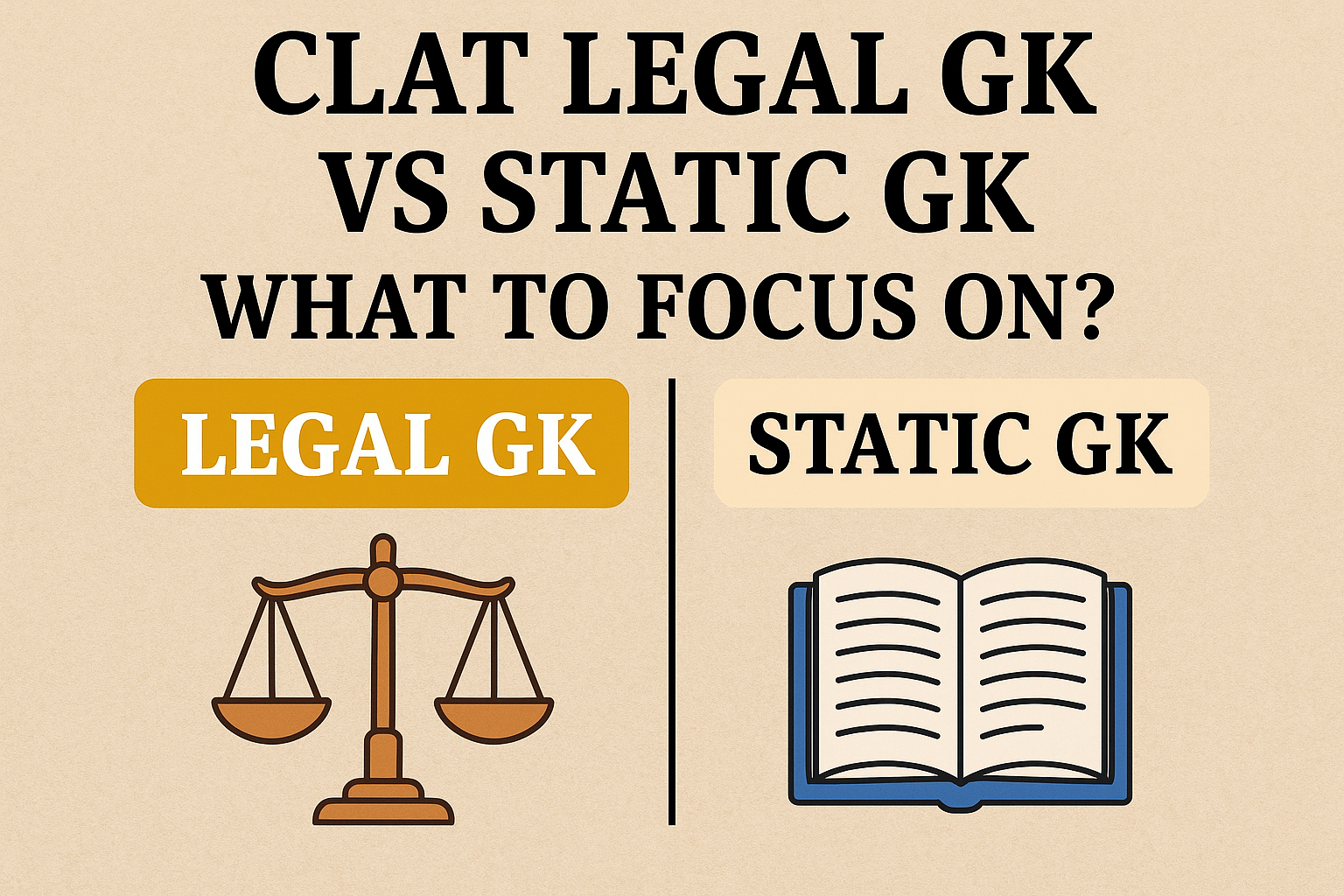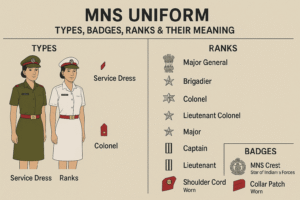A Smart Guide to Prioritize Your CLAT GK Preparation
When preparing for the General Knowledge and Current Affairs section of CLAT, students often find themselves confused between Legal GK and Static GK. With only limited time and vast content available, it’s important to understand what to prioritize and how much time to spend on each. This article will guide you on the difference between Legal GK and Static GK, their importance in CLAT, and what you should focus on for better results.
UNDERSTANDING CLAT GK SECTION
The GK & Current Affairs section in CLAT tests your:
Awareness of national and international news
Understanding of legal developments
Knowledge of important facts and general concepts
It comprises 35–39 questions, mostly passage-based, and draws from recent events and legal topics. So, it’s not just about memorizing facts but also understanding context.
WHAT IS LEGAL GK?
Legal GK refers to general knowledge related to the legal field. It includes:
Important legal developments
Landmark judgments and verdicts
Important constitutional provisions
Recent bills, laws, and amendments
Significant legal debates and events
Examples of Legal GK topics:
The Citizenship Amendment Act
Landmark case: Kesavananda Bharati v. State of Kerala
Fundamental Rights and Duties
Recent Supreme Court judgments
Bills like the Data Protection Bill
Legal GK is dynamic, based on recent legal news, but having a foundation in basic legal concepts helps a lot.
WHAT IS STATIC GK?
Static GK refers to facts and information that do not change over time. It includes:
Indian geography, history, and polity
Important books and authors
Awards and honours
National symbols
Capitals, currencies, organizations
Classical dances, monuments, etc.
Examples of Static GK topics:
First President of India
Capital of Uzbekistan
Bharat Ratna award winners
Indian National Symbols
Static GK is factual and can be rote-learned, but questions from this area are rare in modern CLAT papers.
CLAT GK TREND ANALYSIS (LAST 3 YEARS)
| Year | Legal GK | Static GK | Current Affairs | Type of Questions |
|---|---|---|---|---|
| 2022 | High | Low | High | Passage-based |
| 2023 | High | Low | Very High | Analytical |
| 2024 | Moderate | Very Low | High | Contextual |
Key Takeaway:
Current and Legal GK dominate the paper. Static GK is almost negligible in recent years and often appears indirectly or within context-based passages.
WHAT SHOULD YOU FOCUS ON FOR CLAT GK?
Focus More On:
Legal developments (recent and relevant)
National and international news
Government schemes and policies
Judgments by the Supreme Court and High Courts
New bills and acts
Editorials and legal articles
Important UN/World events and summits
Focus Less On:
Mugging up capitals and currencies
Dates of historical events
Awards unrelated to legal or national significance
Sports stats unless legally or socially relevant
HOW TO PREPARE FOR CLAT LEGAL GK AND CURRENT AFFAIRS
1. Read Newspapers Daily
The Hindu or The Indian Express
Focus on editorials, legal developments, and current affairs
Make short notes of important events
2. Follow Monthly GK Capsules
Use reliable sources like LegalEdge, GKToday, or CLAT Possible
Focus on legal and national news from the last 10–12 months
3. Use Legal GK Compilations
Read monthly or bi-weekly legal affairs summaries
Refer to judgments and case briefs in simple language
4. Practice Passage-Based Questions
Use mocks and sectional tests to solve comprehension-based GK
Improve speed, context analysis, and retention
5. Maintain a Current Affairs Notebook
Divide it into sections: Legal, International, Government, Economy, Environment
Update it weekly with headlines and summaries
SEO KEYWORDS TO INCLUDE
CLAT legal GK vs static GK
CLAT GK preparation strategy
how to prepare for legal GK in CLAT
static GK for CLAT 2025
CLAT 2025 GK syllabus
best sources for CLAT current affairs
CLAT legal current affairs preparation
FREQUENTLY ASKED QUESTIONS (FAQs)
Q1. Is static GK asked in CLAT?
Rarely. Static GK is not a major focus in CLAT anymore. The exam prefers current and contextual legal awareness.
Q2. How many months of current affairs should I prepare for CLAT?
Prepare at least 10–12 months of current affairs before the exam date.
Q3. What are some good sources for CLAT Legal GK?
Newspapers (The Hindu, Indian Express)
LegalEdge Legal Current Affairs
Supreme Court’s landmark judgments
Online platforms like GKToday, CLAT Possible, Lawctopus
Q4. How can I improve my legal GK for CLAT?
Read and summarize legal news weekly
Solve passage-based legal GK questions
Watch explainer videos on legal developments
Q5. Is reading static GK still necessary for CLAT 2025?
Basic static GK (like Indian polity and awards) may help in comprehension, but don’t waste time memorizing outdated facts.
CONCLUSION
When it comes to CLAT GK preparation, Legal GK and Current Affairs must be your top priorities. Static GK plays a minimal role and can be covered lightly. Focus on understanding the context, reading legal news daily, and practicing passage-based questions.
CLAT rewards understanding and awareness, not rote memorization. Learn smart, stay updated, and focus where it matters most.






